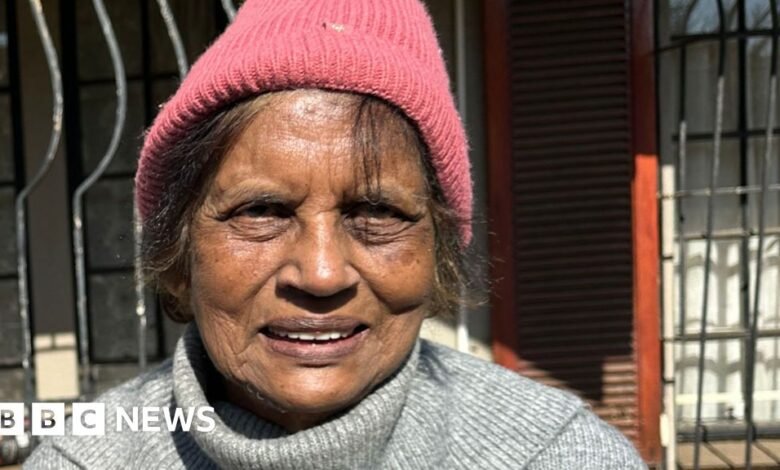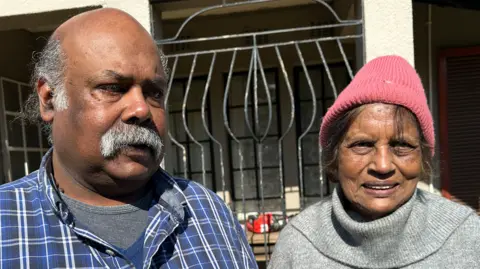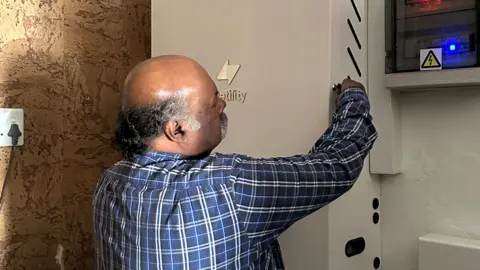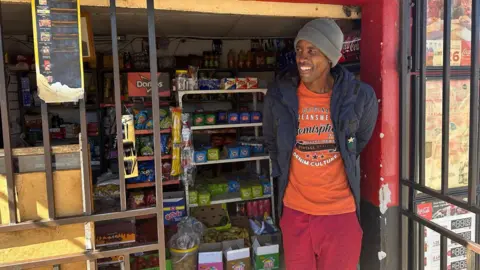Pay-as-you-go system helps save lives

BBC Information, Johannesburg
 Pumza Fihlani / BBC
Pumza Fihlani / BBCSouth Africa Mark Mozaly believes that the set up of the native photo voltaic system helped to maintain his 81 -year -old mom alive.
She spent three weeks in intensive care final yr, and now she returned house in Benononi, east of Johannesburg, she wants an oxygen car to assist her breathe.
However it isn’t attainable to depend on irregular electrical energy provide within the nation.
“There have been days we might have been with out power for six hours. I had to make use of a automotive battery to run her oxygen tank, however that didn’t final lengthy and you must sit together with her together with her arms to attempt to get oxygen in her lungs,” Moodley advised BBC.
“Typically we needed to hurry it to the hospital when it did not work. It was scary.”
At the moment, the docs advised the household that it might not have a very long time to stay. However mounted energy provides gave them extra time collectively.
“It was the savior. I should not confirm it consistently through the evening. I do know that its oxygen tank has energy, no matter it’s,” says a sound trembling.
Regardless of the current enhancements within the South African energy community, there’s nonetheless a break.
The presence of a agency electrical energy provide within the nation, which carries practically 15 years of “loading” – has turn out to be – energy outages on the nation stage had been offered to scale back stress on fragile infrastructure.
Along with endangering some lives, the disaster has affected financial progress and contributed to job losses.
South Africa relies upon closely on the extremely contaminated charcoal – it represents about 80 % of all of the electrical energy generated. However in recent times, the restrictions imposed on producing small photo voltaic power have eased and created tax incentives for set up.
The nation can also be on the lookout for extra funding in renewable power with the intention to assist shift in coal.
On the native stage, those that have monetary means have step by step took their houses and firms outdoors the community, the place they invested in photo voltaic power programs that require preliminary bills ranging between 14,000 and 19600 {dollars} (10,400 pounds-14500 kilos).
 Pumza Fihlani / BBC
Pumza Fihlani / BBCThis worth signifies that this selection is way from the attain of most of South Africa. Those that abandon the daylight within the nation and spend money on clear and dependable power.
However Mr. Moodley was in a position to resort to the fee scheme as you-you who stored the lights and medical tools.
His electrical energy invoice decreased by $ 80 per week – financial savings that he hoped to make use of to develop what he has, and ultimately he’s fully deviated from the community.
The system that it makes use of comes from Wetility, an area startup that was established in 2019
For native customers, the essential bundle prices $ 60 a month – and there’s no preililed increase – which makes photo voltaic power simpler.
The corporate says it has recognized a market hole – an inexpensive photo voltaic resolution designed for small corporations and low -income households.
“South Africa is conventional to a big entry to electrical energy – however arrival doesn’t imply something if the power is unreliable or reasonably priced,” says Vincent Maposa, the corporate’s founder and former power analyst.
“We needed to develop merchandise appropriate for functions and may be financially accessible.”
Though photo voltaic power will not be new in South Africa, the Wetility enterprise mannequin features a month-to-month fee plan for cell fashion, permitting clients to unfold value.
 Pumza Fihlani / BBC
Pumza Fihlani / BBCFor years, the obtain was used as a last try to take care of the nationwide community from full collapse, after a long time of mismanagement in ESKOM.
Whereas the facility outages of some city facilities decreased, the poorest societies and businessmen are nonetheless affected by compelled reductions, because the infrastructure of growing older to satisfy the growing demand.
For some within the cities, considerations about theft and sensible software additionally led folks to lift folks to acquire photo voltaic tools, however moisture additionally designed light-weight and versatile panels that may be put in on the roofs of fragile houses in lots of of those areas.
“We’ve reached a skinny portray of movies that persist with the floor. If somebody tries to peel it, it’s tearing and changing into with out worth. This was necessary for the areas the place theft is a supply of concern,” says Mr. Maposa.
“When it comes to effectivity, it results in conventional panels.”
The ability unit, together with the inverter, which converts the power ensuing from the panels into helpful electrical energy, and a battery that works when the solar doesn’t shine, is secured in a big metal field weighing about 300 kg wipes on the wall.
The group says this reduces the chance of theft and avoids consideration in excessive -crime areas.
 Pumza Fihlani / BBC
Pumza Fihlani / BBCJulius Koobetseng not too long ago changed into photo voltaic power that will have saved the small grocery retailer.
At a hat of the grey hat and a thick blue jacket to thrust back the chilly within the winter within the southern hemisphere, containers of drink accumulate in a shiny fridge that remembers how repeated energy reductions have virtually shattered his livelihood.
“The meat will explode, and the dairy would spoil. Typically we will probably be with out salad for 4 days,” says 43 -year -old.
However since March, his retailer in Krugersdorp, West Johannesburg has used the AS-YOG-GOD photo voltaic system to maintain the lights and fridges.
Some small enterprise homeowners have changed into reserve diesel mills, however Mr. Koobetsing, who has had his retailer over the previous 13 years, has been drawn to essentially the most environmentally environmentally choice.
“The power reductions badly affected small corporations,” he says.
“We stay from month to month, relying on what the work brings. In case you can not assure energy, how do you propose for the long run?”
Now it doesn’t fear when the facility that was “nice consolation” comes out.
His work prices $ 250 a month, however Mr. Koobetsing’s enterprise was chosen because of the dependable energy.
“Folks know that my store stays open even when the authority comes out. Some come solely to direct charges on their units, however whereas they’re right here, they purchase issues too,” says with a smile.
For him, the profit will not be associated to the discount of electrical energy payments. That is consistency.
“Photo voltaic power has gave me management. I can plan Limi figuring out that I’ve energy.”
You may additionally be keen on:
 Getty Photographs/BBC
Getty Photographs/BBC2025-07-21 23:40:00






